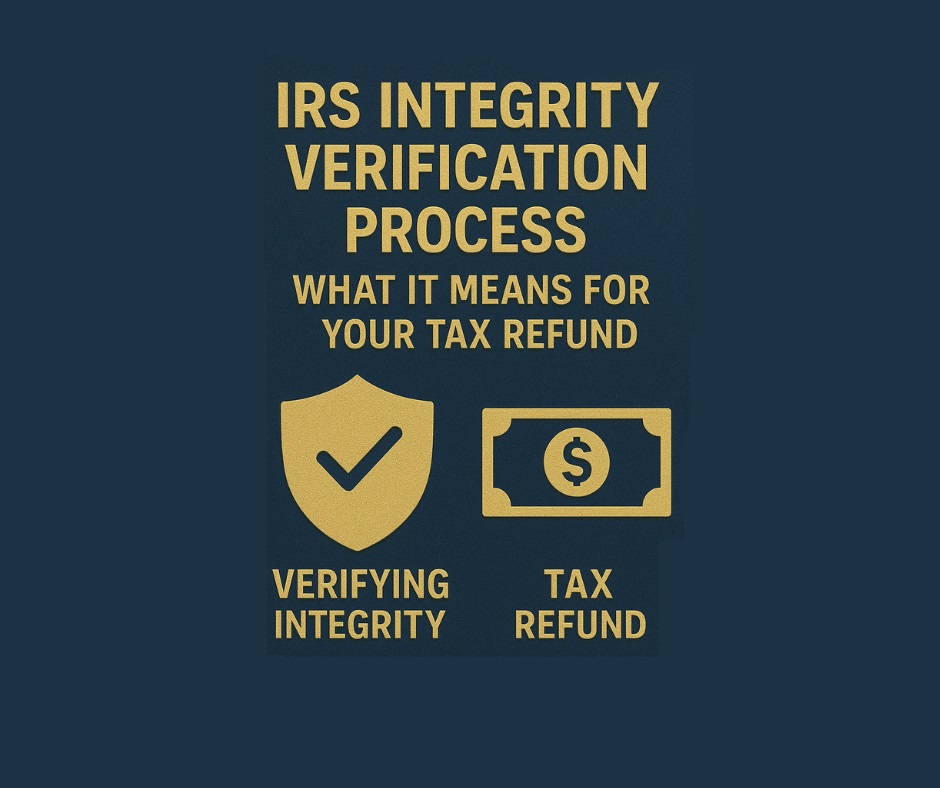Facing a delay in your tax refund? The IRS Integrity Verification Process, also known as Return Integrity Verification Operations (RIVO) or Integrity and Verification Operations (IVO), might be the reason. This specialized IRS program is designed to combat fraud, identity theft, and improper refunds by thoroughly screening tax returns. While it protects the tax system, it can mean longer waits and extra steps for taxpayers. In this guide, we’ll explain what the IRS Integrity Verification Process is, how it works, common triggers, and tips to navigate it smoothly to get your refund faster.

What Is the IRS Integrity Verification Process?
The IRS Integrity Verification Process is a critical safeguard to ensure only legitimate tax returns are processed. Here’s what it does:
- Fraud Detection: Uses advanced algorithms to flag returns with suspicious activity, such as potential fraud or identity theft.
- Income Verification: Compares your return’s income and withholding data against employer documents like W-2s and 1099s.
- Targeted Scrutiny: Focuses on returns with high fraud risk scores, unusually large refunds, or inconsistent information.
This process ensures the tax system’s integrity but can delay refunds for honest taxpayers caught in the review net.
How the IRS Integrity Verification Process Works
The process follows a clear sequence to verify returns:
- Automated Screening: Computer systems like the Dependent Database or Return Review Program score returns for fraud risk.
- Document Checks: IRS staff verify income and withholding by contacting employers via the Workload Management System or Contact Employer (CE) tools.
- Identity Confirmation: If identity theft is suspected, the IRS sends letters (e.g., Letter 4883C or 5071C) requiring taxpayers to verify their identity online, by phone, or at a Taxpayer Assistance Center.
- Additional Information Requests: Taxpayers may need to submit documents to resolve discrepancies.
- Refund Hold: Refunds are paused until verification is complete, which can take 60 days or more.
- Resolution or Escalation: Valid returns proceed to processing; fraudulent ones may face audits or criminal investigation.
Common Triggers for IRS Integrity Verification
Wondering why your return was flagged? Here are common reasons:
- First-Time Filers: No prior tax history raises red flags.
- Large Refunds: Refunds much larger than previous years attract scrutiny.
- Inconsistent Data: Mismatched income or withholding compared to W-2s/1099s.
- Fake EINs: Using fabricated Employer Identification Numbers.
- SSN Issues: Social Security Number mismatches or multiple uses.
- Complex Credits: Claims for credits like the Earned Income Tax Credit (EITC) or Child Tax Credit (CTC) may trigger reviews.
How the Process Affects Taxpayers
The IRS Integrity Verification Process can significantly impact taxpayers:
- Refund Delays: Expect waits of 60 days or longer as the IRS completes its review.
- Action Required: You must respond promptly to IRS letters or requests to avoid further delays or refund denials.
- Identity Verification: Verifying your identity online, by phone, or in person can be time-consuming and stressful.
- Adjustments or Audits: Refunds may be reduced, denied, or lead to audits if discrepancies are found.
- Appeal Options: If issues persist, you can appeal or seek help from the Taxpayer Advocate Service.
Tips to Navigate the IRS Integrity Verification Process
Don’t let the process overwhelm you! Follow these steps to minimize delays:
- Respond Quickly: Act immediately if you receive an IRS letter (e.g., 5071C, 4883C, or 6331C). Use the IRS’s Identity Verification Service online or call the number provided.
- Keep Records: Save copies of all correspondence and documents sent to the IRS.
- Check Your Transcript: Monitor your IRS tax transcript on IRS.gov to track updates or verification status.
- Seek Professional Help: If the process feels complex, consult a tax professional or CPA for guidance.
- Use IRS Tools: Check your refund status with the “Where’s My Refund?” tool or IRS2Go app for real-time updates.
Why This Matters
The IRS Integrity Verification Process protects the tax system from fraud, ensuring fairness for all taxpayers. However, it can feel frustrating when your refund is delayed. By understanding the process and responding promptly, you can avoid prolonged waits and get your refund sooner. Stay proactive and keep track of IRS communications to navigate this process with confidence.
The IRS Integrity Verification Process (RIVO/IVO) is a vital tool to prevent tax fraud and identity theft, but it can lead to refund delays and extra steps for taxpayers. By knowing the triggers, understanding the process, and responding quickly to IRS requests, you can minimize complications and get back on track. Don’t let delays stress you out—take control and stay informed!
